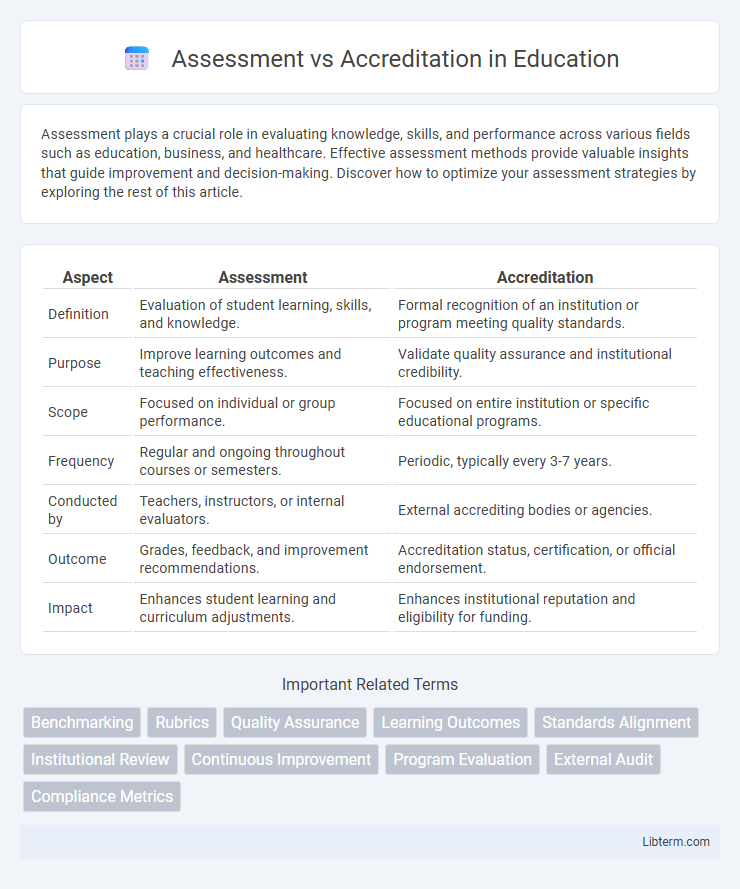Assessment plays a crucial role in evaluating knowledge, skills, and performance across various fields such as education, business, and healthcare. Effective assessment methods provide valuable insights that guide improvement and decision-making. Discover how to optimize your assessment strategies by exploring the rest of this article.
Table of Comparison
| Aspect | Assessment | Accreditation |
|---|---|---|
| Definition | Evaluation of student learning, skills, and knowledge. | Formal recognition of an institution or program meeting quality standards. |
| Purpose | Improve learning outcomes and teaching effectiveness. | Validate quality assurance and institutional credibility. |
| Scope | Focused on individual or group performance. | Focused on entire institution or specific educational programs. |
| Frequency | Regular and ongoing throughout courses or semesters. | Periodic, typically every 3-7 years. |
| Conducted by | Teachers, instructors, or internal evaluators. | External accrediting bodies or agencies. |
| Outcome | Grades, feedback, and improvement recommendations. | Accreditation status, certification, or official endorsement. |
| Impact | Enhances student learning and curriculum adjustments. | Enhances institutional reputation and eligibility for funding. |
Understanding Assessment and Accreditation
Assessment evaluates the effectiveness and quality of educational programs by measuring learning outcomes, performance, and institutional processes. Accreditation is a formal recognition granted by authorized agencies that validates an institution or program meets established standards of quality and rigor. Understanding that assessment is an ongoing, internal process while accreditation is an external, periodic validation helps institutions maintain continuous improvement and public trust.
Key Differences Between Assessment and Accreditation
Assessment evaluates individual or organizational performance through data collection and analysis to measure effectiveness and identify areas for improvement. Accreditation is a formal recognition granted by an authoritative body after evaluating an institution or program against predefined standards to ensure quality and compliance. Key differences include scope, with assessment focusing on continuous internal review, while accreditation involves external validation and certification.
Objectives of Assessment in Education/Industry
Assessment in education and industry aims to measure knowledge, skills, and competencies to enhance learning and performance. It provides objective data for identifying gaps, guiding instructional improvements, and ensuring alignment with set standards or job requirements. The primary objective is to support continuous development and validate proficiency for academic success or professional competence.
Accreditation: Purpose and Importance
Accreditation serves as a formal validation process that ensures educational institutions or programs meet established standards of quality and rigor set by recognized authorities. Its purpose is to guarantee reliability, enhance institutional credibility, and provide assurance to students, employers, and stakeholders that the education delivered meets industry and academic benchmarks. Accreditation plays a crucial role in continuous improvement, fostering accountability, and enabling access to funding, certification, and transferability of credits across institutions.
Methodologies Used in Assessment
Assessment methodologies primarily involve systematic data collection, analysis, and evaluation of educational processes, student learning, and institutional performance through tools like standardized tests, surveys, portfolios, and direct observations. These methods emphasize formative and summative approaches, enabling continuous improvement by identifying strengths and weaknesses in curriculum delivery, teaching effectiveness, and learning outcomes. Unlike accreditation, assessment uses quantitative and qualitative evidence to inform stakeholders and guide internal decision-making rather than serve as an external certification process.
Accreditation Processes and Standards
Accreditation processes involve rigorous evaluation frameworks established by recognized accrediting bodies to ensure institutions meet specific quality standards in education, infrastructure, faculty qualifications, and student outcomes. These standards are designed to promote continuous improvement, accountability, and transparency, often relying on self-assessment reports, peer reviews, and site visits to verify compliance. Unlike general assessment, accreditation confirms that an entire institution or program adheres to predefined criteria, enhancing its credibility and eligibility for funding or degree recognition.
Impact of Assessment on Institutional Improvement
Assessment drives institutional improvement by providing systematic data on student learning outcomes, faculty effectiveness, and resource utilization, enabling targeted interventions. Continuous assessment helps identify gaps in curriculum design and instructional methods, promoting evidence-based decision-making and strategic planning. Institutions leveraging assessment results demonstrate enhanced academic quality, increased accountability, and stronger alignment with accreditation standards.
Accreditation Bodies and Regulatory Frameworks
Accreditation bodies serve as authoritative organizations that evaluate and certify institutions or programs based on predefined standards within specific regulatory frameworks. These frameworks establish compliance criteria ensuring quality assurance, accountability, and continuous improvement across various sectors like education, healthcare, and manufacturing. The distinction between assessment and accreditation lies in accreditation's formal recognition granted by these bodies after comprehensive evaluation against stringent regulatory benchmarks.
Challenges in Implementing Assessment and Accreditation
Challenges in implementing assessment and accreditation include ensuring consistent data collection, maintaining objectivity, and addressing resource constraints. Institutions often face difficulties aligning assessment criteria with accreditation standards while fostering stakeholder engagement. Overcoming these challenges requires robust frameworks, continuous training, and transparent communication to uphold educational quality.
Future Trends in Assessment and Accreditation
Future trends in assessment emphasize adaptive technologies and data analytics, enabling more personalized and real-time evaluations of student learning outcomes. Accreditation processes are evolving to incorporate continuous quality improvement models and stakeholder engagement, leveraging digital platforms for greater transparency and accountability. Integration of AI tools and competency-based frameworks is anticipated to transform both assessment and accreditation, ensuring alignment with rapidly changing educational standards and workforce needs.
Assessment Infographic

 libterm.com
libterm.com